democracynow.org
Stories:
 "Everything Was Cut Immediately": LIU Faculty and Students Protest Lockout & Class Cancellations
"Everything Was Cut Immediately": LIU Faculty and Students Protest Lockout & Class Cancellations
This was supposed to be the second week of classes at Long Island University’s campus in Brooklyn, but the administration barred all 400 members of the faculty union from its Brooklyn campus after their contract expired on August 31. The new proposed contract would slash pay for adjunct professors and also pay faculty lower salaries compared to those earned by colleagues at a satellite campus. As part of the lockout, LIU cut off professors’ email accounts and health insurance, and told them they would be replaced. LIU President Kimberly Cline has assured students the lockout would not affect the beginning of the school year. But since the semester began, classes have been taught by replacement teachers, and many are assigned to teach subjects for which they have no experience. We speak with locked-out professor Srividhya Swaminathan, chair of the English Department at Long Island University Brooklyn. We are also joined by Kiyonda Hester, an LIU social work graduate student who is president of the campus group Activists for Social Justice and joined hundreds of students in walking out of classes on Monday.
TRANSCRIPT
This is a rush transcript. Copy may not be in its final form.
AMY GOODMAN: We begin today here in New York, where what may be the first time in U.S. history a university has locked out professors from campus after their contract expired. This was supposed to be the second week of classes at Long Island University’s campus in Brooklyn, but last week the administration barred all 400 members of the faculty union from its Brooklyn campus after their contract expired on August 31st. The new proposed contract would slash pay for adjunct professors and also pay faculty lower salaries compared to those earned by colleagues at a satellite campus. As part of the lockout, LIU cut off professors’ email accounts and health insurance, and told them they would be replaced.
In a letter before the start of classes, LIU President Kimberly Cline assured students the lockout would have no effect on the beginning of the school year. But since the semester started last week, classes have been taught by replacement teachers. Many are scheduled to teach subjects for which they have no experience. In what the school later called an error, the university’s chief operating officer, formerly a professor of political science, was slated to teach yoga. The dean of students for the College of Liberal Arts and Sciences, a botanist by training, was tapped to teach ballet.
Well, on Monday, students staged a walkout from their classes in support of their locked-out professors. Democracy Now! was there.
PROTESTERS: They say lockout! We say walkout! They say lockout! We say walkout!
DEVON WILKS: My name is Devon Wilks. I’m one of the students that put together this protest. Right now, we’re really rallying for our campus president to get our professors back into the office right now. We want our professors to teach. It’s almost been a week since our professors have been locked out, and we’re really upset about that, because we pay almost $40,000 for tuition, and it is unacceptable that our professors are not able to get into the classroom and teach the students.
PROTESTERS: They say lockout! We say walkout! They say lockout! We say walkout!
SRIVIDHYA SWAMINATHAN: My name is Srividhya Swaminathan. I’m the chair of the English Department at LIU Brooklyn. Right now what you’re seeing is a gathering of sympathetic faculty. We are here to support our students as they walk out of class. They are not being supplied with qualified replacement professors, as was promised by this administration, which is a testament to the fact that you cannot replace an entire faculty. The real faculty are out here. We are here, we are ready to teach, and we are being prevented from doing so by this lockout.
PROTESTERS: Join us! Join us! Join us! Join us! Join us! Join us!
VIRGINIA RODRIGUEZ: Virginia Rodriguez. So, I was supposed to have a sociology class this morning. Nobody showed up. Every time I go into a class, they greet you for five to 10 minutes, and they leave. I have no syllabus. They posted a fake syllabus on our blackboard system that’s from last summer. So, I mean, this is just really disappointing, because I pay a lot of money to come to this school. I have two children to support. I cannot afford to take off a whole other semester and keep continuing to put my life on hold. It’s unfair. So, hopefully, we get our professors back as soon as possible.
YVAN DELEN: My name’s Yvan Delen. I didn’t have any class today. I basically came in at 9:00 for no reason. I had no teachers. The students were just sitting there, waited about 25 minutes. No one showed up. I just want this to end. I want my education. I want to get what I’m paying for. I just want this to end. You know, I feel bad for the teachers. I feel bad for the students. It’s really like—it’s really inconvenient.
SHAYLA GRIFFIN: Our professors are not there. They have administrative staff that’s trying to teach our school, and it’s just not working out. Everybody’s walking out of class. There’s nobody there. There’s [inaudible]. It’s horrible. And we want our professors back. Get our professors back.
PROTESTER: What do we want?
PROTESTERS: Our professors!
PROTESTER: When do we want them?
PROTESTERS: Now!
PROTESTER: What do we want?
PROTESTERS: Our professors!
PROTESTER: When do we want them?
PROTESTERS: Now!
STUART FISHELSON: My name is Stuart Fishelson. I’m a faculty member, 30 years in the Media Arts Department. And I’m here because this is what corporations are trying to do to education. They’re trying to corporatize and remove the familiar and the important parts of learning.
SEALY GILLES: My name is Sealy Gilles, and I’ve taught in English Department for almost 20 years. I just retired. I’m supposed to be coming back to teach part-time. And it’s breaking my heart, I have to tell you. It’s a wonderful institution. We have spectacular students, as you can see from this. This president has very little in the way of academic background. She sees herself as a corporate turnaround artist. That’s why the board hired her. And she should be, the board should be ashamed of what’s happening here.
PROTESTERS: LIU, shame on you! LIU, shame on you! LIU, shame on you!
CATHY: I’m looking at you, Dr. Cline. I’m looking at you. This should not be happening.
CHARINA NADURA: How do you feel? Why are you walking out?
CATHY: I’m angered right now. I’ve spent over $100,000, moved to California, to study under my professor, for her to lock them out. I’m in my last year. My licensure is on the line.
AMY GOODMAN: Special thanks to Charina Nadura and Andre Lewis for that report. Those are professors and students at Long Island University’s campus in Brooklyn, speaking during a campus walkout on Monday.
LIU’s Chief Operating Officer Gale Haynes told Democracy Now! in statement, quote, "The University will continue to bargain in good faith, with the goal of welcoming its valued faculty back to the classroom upon timely resolution of the contract. During this timeframe, we will remain laser focused on our students beginning the Fall semester with little or no disruption to their academic studies."
Well, for more, we’re joined by two guests. Vidhya Swaminathan is the chair of the English Department at Long Island University Brooklyn and one of 400 faculty members locked out of the campus. And Kiyonda Hester is a social work graduate student and president of Activists for Social Justice, a student organization at Long Island University.
We welcome you both to Democracy Now! Professor, let’s begin with you. How long have you been chair of the Department of English?
SRIVIDHYA SWAMINATHAN: This would have been my fifth year as chair. I’ve been at LIUfor 13 years.
AMY GOODMAN: What happened?
SRIVIDHYA SWAMINATHAN: It’s very difficult to—it’s a very complicated situation, but essentially what happened is, is we have a president who does not value the labor of faculty and believes that we are replaceable, which is an affront in and of itself. August 31st was the—August 31st was the expiration of our contract. The negotiating team was told on that day that if we did not accept the contract, that we would be locked out. Before the membership was even given the opportunity to vote on this contract, we were told by management that we would be locked out of campus. This was clearly a bullying tactic to force a contract down our throats. Now, the management characterized this contract as fair and reasonable. If that’s truly the case, then why didn’t they give us an opportunity to vote on it before they decided to take the very drastic step of locking us out?
AMY GOODMAN: Where—what were the issues that you were concerned about?
SRIVIDHYA SWAMINATHAN: There are two primary issues, one under the umbrella of economics and one under the umbrella of academic freedom. In terms of economics, there is a parity disagreement with the C.W. Post campus, which is the other main campus, that the contract did not address in satisfactory ways.
AMY GOODMAN: The C.W. Post campus is on Long Island.
SRIVIDHYA SWAMINATHAN: Yes, that’s correct. The other issue in terms of economics was the creation of a two-tier system, that would have greatly disadvantaged incoming adjuncts as well as new hires on full-time faculty lines. And there were also severe restrictions put on adjunct earning capacity. So, basically, they wanted to take back adjunct pay in order to address the disparity with full-time pay, which is just absolutely unacceptable.
The other issue was academic freedom. This management has attempted more and more to encroach on curricular issues that really are the purview of the faculty. They are in violation of all our shared governance agreements. And over the summer especially, they took aggressive steps to disenfranchise faculty by preemptively canceling classes, by putting advertisements on Monster.com for replacement faculty. The whole notion that you could replace a faculty by advertising on Monster.com just flies in the face of what academia is actually about.
AMY GOODMAN: Labor historians say they can’t recall an example of a university using a lockout against their faculty members, that’s total lockout.
SRIVIDHYA SWAMINATHAN: That is correct. For all we know, this is the first in U.S. history, which is why this lockout has national implications.
AMY GOODMAN: So, Kiyonda Hester, you’re a student. What happened on the first day of classes last week? What classes did you have?
KIYONDA HESTER: So, for me, I had my core classes, because I’m in my second year of this program.
AMY GOODMAN: Those are the required classes.
KIYONDA HESTER: Yeah, this is the required classes. So I had my social work forensic science class, that ties in criminal justice for the family welfare. And I went into that class, and the administrative person was there, and he explained that he’s not qualified to teach this. He’s been all over, teaching about 15 other classes that day, that he was assigned to.
AMY GOODMAN: Wait. Now, the president says you will have equal education.
KIYONDA HESTER: Mm-hmm.
AMY GOODMAN: What was the role of the teacher in your class? What was the person’s position before? I mean, he was an administrator?
KIYONDA HESTER: He’s an administrator, yeah. He does—to my knowledge, he does our field placements. But he’s not qualified to teach that class, in particular.
AMY GOODMAN: And he told you that.
KIYONDA HESTER: And he stated that. And he also stated that he just hopes that this will end next week, took attendance, tried to give us a little bit of knowledge, and then we went about our way.
AMY GOODMAN: What other cases were you involved with, or your fellow sister students involved with?
KIYONDA HESTER: Well, I have a friend who’s also in the Social Work Department, and she was literally in the class next door. She’s taking the substance abuse part of the Social Work Department. And she was sent an email stating the change, the room change. They go into the classroom, and I actually peaked in. They have a Skype going on with LIU Post students, where the professor was supposed to teach both classes. They never showed up. Even though they sent an email stating for a room change, they just completely never showed up. So, that’s what we’re dealing with.
And right now, for me, personally, I have no qualified professors, actually, to teach me. I am a student who commutes to LIU Brooklyn. And I chose to have a 8:45 class, which is hard, on a Saturday, considering traffic from the trains in New York, and I only chose that class because I knew the professors and the quality of them and how they can teach us. And that’s not what we’re getting at this point.
AMY GOODMAN: So what are your plans? What are the students doing? Talk about the walkout yesterday.
KIYONDA HESTER: So, we’ve actually—we actually started rallying up that Wednesday. Once we assessed the situation, we quickly got together, and we started then. And we’ve been continuing since then. We’ve been trying to. We’ve been sending letters out to Mayor de Blasio. We’ve been trying to get—send letters out to the board of trustees and call them, send letters to Kimberly Cline. And we’ve also been trying to make as much noise as possible, because we’ve been called, by Gale Haynes, the vocal minority. We’ve been looked at as "Well, that’s just, you know, a few of them who are saying anything; that doesn’t represent the 8,000 students that’s basically on campus in Brooklyn."
AMY GOODMAN: How much is tuition at Long Island University Brooklyn?
KIYONDA HESTER: It ranges from $30,000 to $54,000, depending on if you’re staying on campus.
AMY GOODMAN: For the year.
KIYONDA HESTER: For the year, yeah.
AMY GOODMAN: Professor, what happened when you were locked out? So, you didn’t walk out; you were locked out.
SRIVIDHYA SWAMINATHAN: Absolutely.
AMY GOODMAN: Pay? Healthcare?
SRIVIDHYA SWAMINATHAN: Everything was cut immediately.
AMY GOODMAN: Your health insurance was immediately cut.
SRIVIDHYA SWAMINATHAN: Yes, exactly. Health insurance was cut. Pay was cut. Again, as I said, this was a bullying tactic to force this contract down the faculty’s throat. We did meet on Tuesday, September 6, to ratify the contract. This, by the way, is what we have done every contract ratification, is met the day after Labor Day. And we voted 226 to 10 not to accept this contract, at which time the administration said the lockout would continue. And the lockout does continue.
My two major issues with the statement that has been issued by this administration is that they are bargaining in good faith and that they are laser-focused on the students, neither of which seems to be true. They are not bargaining in good faith. We have—we are the fifth of five unions on campus that have no contract. So, this is a labor issue writ large. This president is incapable of working with labor and sees us all as fungible commodities, which is deeply problematic. If she is in fact invested in the degrees that this university is claiming to grant, how can she then devalue the degrees the faculty have in training people in order to get these degrees? It seems very counterintuitive to me.
AMY GOODMAN: In a statement supporting the LIU union faculty members, American Federation of Teachers President Randi Weingarten wrote, quote, "Long Island University’s hostile action to lock out faculty rather than deal with the fact that it pays its Brooklyn faculty less than their counterparts is a slap in the face to its students and their teachers. The university would rather act like a tough guy and bully its faculty than meet its academic obligation to its students and confront a moral obligation to not pay one set of educators less than another." Talk about—well, what are the demographics of the students at C.W. Post, Long Island—in Long Island, LIU’s Long Island campus, versus LIU in Brooklyn?
SRIVIDHYA SWAMINATHAN: They are quite different. The demographics at the C.W. Post campus pulls from the demographics of Long Island. It is a suburban campus, so they don’t have the same degree of diversity that we have on the Brooklyn campus. And by diversity, I mean a broad range, not just racial, but also gender diversity, also diversity in age, as well as diversity in immigration status. We have a lot of first-generation college students. We have a lot of children of immigrants, immigrants themselves, coming to the Brooklyn campus. We are the United Nations of college campuses in many ways. And the Post campus does not have the same degree of diversity, which I find very problematic that then a pay disparity exists between the two campuses.
AMY GOODMAN: LIU has a page on its website dedicated to updating information about the lockout. The school addressed the issue of teacher salaries in contract negotiations, writing, quote, "Based on the most recent contract, the Brooklyn faculty and adjuncts are well compensated when compared to peers at other institutions within the tri-state area and nationally. Average salaries for LIUFF faculty at LIU Brooklyn outperformed 80 percent of peer 4-year Master’s colleges and universities across the United States in academic year 2015-2016."
The school also describes its reason for the lockout, saying, quote, "While the lockout instituted by the University is an isolated incident, five out of the last six contract negotiations have resulted in strike votes by the LIU Brooklyn faculty—including one lasting nearly two months. ... A strike situation—which appeared to be inevitable as the faculty authorized and publicized a vote this year in May, before active negotiations were even underway—would clearly compromise our ability to keep tuition affordable ... In the interest of providing stability for students, the University was forced to develop a contingency plan—bringing in a qualified and temporary teaching staff to ensure classes could start as scheduled." Your response to that?
SRIVIDHYA SWAMINATHAN: The entire statement is riddled with falsehoods. Five out of the last six contracts ended in a strike is a falsehood. We did not strike in 2000. We did not strike in 2006. We do have our—we do have a history of striking. If you go toLIUFF.net, which is our union website, you can pull up a history of when and how we have gone on strike. The two-month strike referred to, I believe, took place in 1985. There have been several contracts since then. So, that is falsehood number one.
Second is, don’t look at comparable institutions; look at your own institution. If there’s a pay disparity between two campuses, it’s irrelevant what other institutions are making. Moreover, they are stealing from the adjuncts to pay the full-timers. It’s robbing Peter to pay Paul. That is not a sound strategy. This president touts the fact that she has saved $30 million for the campus in surplus funds—she describes them as surplus funds—and then turns around and says she can’t pay the faculty. I think if you look at also what administration is paid salary-wise, I think that’s also very telling in terms of their supposed impoverishment. The idea of pitting faculty against the students, as though if one gets something, the other doesn’t, is nasty.
AMY GOODMAN: So what are your plans? You don’t have health insurance now?
SRIVIDHYA SWAMINATHAN: No, do not have health insurance. The union has organized information sessions for its membership on COBRA. We were given information aboutCOBRA from the administration. And even on that, we were given false information. The reason for COBRA was stated as the result of reduction of hours because of a LIUFF job action—again, a falsehood. It was their action against us.
We have also filed for unemployment, which is what we are allowed to do in the event of a lockout. I have never filed for unemployment in my life, and it is galling to have to do so. I spent eight years working on a master’s and a Ph.D. I am a tenured professor. I just achieved full professor status. According to the document, it was supposed to start September 1st. I don’t even know the status of that at this point.
AMY GOODMAN: And what are your plans as a student, as we wrap up?
KIYONDA HESTER: At this point, what we’re going to continue to do is continue to stand behind our faculty and continue to rally outside and to demand to end this lockout. And we just ask everybody to support us; all family, friends, parents, everybody, to come out.
AMY GOODMAN: I want to thank you both for joining us. Vidhya Swaminathan is chair of the English Department at LIU Brooklyn, Long Island University Brooklyn, and Kiyonda Hester, graduate student and organizer at LIU Brooklyn.
This is Democracy Now! We’ll be back in a moment with the woman, 15 years ago, who said no to war on the floor of the House. We’ll hear her speech and speak with her, Congressmember Barbara Lee. ...Read More → Lawyer for Imprisoned Whistleblower Chelsea Manning: Ongoing Pattern of Abuse Led to Hunger Strike
Lawyer for Imprisoned Whistleblower Chelsea Manning: Ongoing Pattern of Abuse Led to Hunger Strike
We speak with Chase Strangio, lawyer for imprisoned Army whistleblower Chelsea Manning, about the hunger strike she launched Friday to protest her prison conditions. In a statement, Manning said she would only consume water and medication until she’s provided "minimum standards of dignity, respect, and humanity." She’s demanding a written promise from the Army that she will receive medically prescribed recommendations for her gender dysphoria. Manning is serving a 35-year sentence in the disciplinary barracks in Fort Leavenworth, Kansas. She has been subjected to long stretches of solitary confinement and denied medical treatment related to her gender identity. Strangio is a staff attorney at the ACLU who represents Chelsea Manning in a lawsuit against the Department of Defense.
TRANSCRIPT
This is a rush transcript. Copy may not be in its final form.
AMY GOODMAN: We turn now to imprisoned Army whistleblower Chelsea Manning. On Friday, Manning began a hunger strike to protest her prison conditions. In a statement, she said she would only consume water and medication until she’s provided, quote, "minimum standards of dignity, respect, and humanity," unquote. She’s demanding a written promise from the Army that she will receive medically prescribed recommendations for her gender dysphoria.
Manning is serving a 35-year sentence in the disciplinary barracks in Fort Leavenworth, Kansas. She has been subjected to long stretches of solitary confinement and denied medical treatment related to her gender identity. In an interview published by The Guardian last month, Chelsea Manning said, quote, "I am always afraid. I am still afraid of the power of government. A government can arrest you. It can imprison you. It can put out information about you that won’t get questioned by the public—everyone will just assume that what they are saying is true. Sometimes, a government can even kill you—with or without the benefit of a trial."
Well, for more, we’re joined by Chase Strangio, staff attorney at the ACLU. He represents Chelsea Manning in a lawsuit against the Department of Defense.
Chase, welcome back to Democracy Now! Talk about what is happening with Chelsea in prison right now.
CHASE STRANGIO: So, you know, after six years of being locked away by our government, Chelsea has used really one of the only forms of protest available to her, which is her body, to draw attention to the ongoing abuses that she has faced. And on Friday, she began a hunger strike, which, she has made clear, will continue until she receives written assurances from the government that she’s not only going to be treated properly for her gender dysphoria, but that the ongoing harassment and abuses against her, culminating most recently with the charges brought against her related to her attempted suicide, will stop.
AMY GOODMAN: Let’s go to the Chelsea Manning statement announcing her hunger strike. She said, quote, "I have decided that I am no longer going to be bullied by this prison—or by anyone within the U.S. government. I have asked for nothing but the dignity and respect—that I once actually believed would be provided for—afforded to any living human being," unquote. She goes on to say, "I do not believe that this should be dependent on any arbitrary factors—whether you are cisgender or transgender; service member or civilian, citizen or non-citizen. In response to virtually every request, I have been granted limited, if any, dignity and respect—just more pain and anguish." So, tell us, Chase, about the last few months. Chelsea attempted suicide. Is that right? That’s why we last spoke to you.
CHASE STRANGIO: Yeah, so, on the weekend of July 4th, Chelsea attempted to take her own life. And she was unsuccessful in that attempt, and ultimately conveyed to us that she was happy to be alive. But during her recovery, while she was still under medical observation status, she was served with official charges, administrative charges from the prison, indicating that she would be punished for attempting to take her life. And just yesterday, she was formally served those charges, and will be facing an administrative board on September 20th. So, that really does reflect the ongoing pattern of abuses that she’s experiencing. Even when she goes so far as to—as to decide that the only agency she has left is to end her life, her survival itself becomes a mode of punishment.
AMY GOODMAN: Talk about her life in prison at Leavenworth every day.
CHASE STRANGIO: Chelsea is an incredibly strong and resilient person, and she is able to navigate so much. But I think what she’s being faced with is the prospect of another three decades in prison being treated with this ongoing surveillance, punished for toothpaste, punished for books, punished for, you know, not properly writing her name in her books every time, and then also being told repeatedly that despite the medical recommendations of the Army’s own providers, she will not be treated with the healthcare that she needs. And despite the fact that in our filings before the court, almost two years ago, we indicated that she was at a grave risk of attempted suicide and possible successful suicide, they have continued to enforce male grooming standards against her and not follow the treatment protocols of her recommend—recommended by her provider.
AMY GOODMAN: I want to turn to a clip from—well, at the time, it was then Secretary of State Hillary Clinton, in December 2011, the day before Army whistleblower Private Chelsea Manning went on trial for passing hundreds of thousands of documents to WikiLeaks.
SECRETARY OF STATE HILLARY CLINTON: I think that in an age when so much information is, you know, flying through cyberspace, we all have to be aware of the fact that, you know, some information which is sensitive, which does affect the security of individuals and relationships, deserves to be protected. And we will continue to take necessary steps to do so.
AMY GOODMAN: That was Hillary Clinton, years ago, when she was secretary of state. Chase Strangio, do you think that Chelsea Manning is suffering from retaliation for the—what—for the release of documents?
CHASE STRANGIO: I think Chelsea’s experience in prison has been an ongoing set of retaliatory actions by the government, from her treatment at Quantico to her denial of healthcare to the ongoing scrutiny that she faces. And she really is someone who put her life on the line for things that she believes in. And I think, as a society, we have an obligation to continue to stand behind her as she continues to suffer the consequences of that. ...Read More →
This week marks the 15th anniversary of the September 11, 2001, attacks. They were followed within three days by a nearly unanimous vote in Congress to approve the Authorization for Use of Military Force against those responsible. The lone dissenter was Democratic Representative Barbara Lee of California. We play an excerpt from her speech that day and speak with Lee about how the resolution has been used since then. "I voted against that resolution 15 years ago because it was so broad that I knew it was setting the stage and the foundation for perpetual war. And that is exactly what it has done," Lee notes. "It’s been used over 37 times everywhere in the world," including Syria, Iraq, Yemen and Somalia. She says bipartisan support is building to repeal the measure.
TRANSCRIPT
This is a rush transcript. Copy may not be in its final form.
AMY GOODMAN: This week marks the 15th anniversary of the September 11th attacks. Thousands gathered in New York this weekend for a solemn ceremony marking the anniversary of when two hijacked airplanes crashed into the World Trade Center. Memorials were also held at the Pentagon and at the site in western Pennsylvania where a hijacked plane crashed on September 11, 2001.
Well, right after the attacks, the Bush administration demanded from Congress the legal authorization to use military force against those they deemed responsible for the attack, thus beginning the war on Afghanistan. The Senate soon approved the Authorization for Use of Military Force by a vote of 98 to zero. In the House, it passed 420 to 1. The lone dissenting vote was Democratic Congressmember Barbara Lee of California, who, three days after the 9/11 attack, voted no. This is the speech she gave on the floor of the House.
REP. BARBARA LEE: September 11th changed the world. Our deepest fears now haunt us. Yet I am convinced that military action will not prevent further acts of international terrorism against the United States. This is a very complex and complicated matter. Now, this resolution will pass, although we all know that the president can wage a war even without it. However difficult this vote may be, some of us must urge the use of restraint.
Our country is in a state of mourning. Some of us must say, let’s step back for a moment. Let’s just pause, just for a minute, and think through the implications of our actions today, so that this does not spiral out of control. Now, I have agonized over this vote. But I came to grips with it today, and I came to grips with opposing this resolution during the very painful, yet very beautiful, memorial service. As a member of the clergy so eloquently said, as we act, let us not become the evil that we deplore.
AMY GOODMAN: That was Democratic Congressmember Barbara Lee of California casting the sole dissenting vote against the Authorization for Use of Military Force—that vote, September 14, 2001, 15 years ago tomorrow. After her speech, she was inundated with insults and death threats, reportedly needed around-the-clock bodyguards. Less than a month later, October 7, 2001, the Afghanistan War was on. It would become the longest war in U.S. history. Fifteen years later, the Obama administration continues to use the same military authorization for other attacks.
For more, we go to Capitol Hill, where Congressmember Lee joins us from the Cannon Rotunda. She is chair of the Congressional Progressive Caucus Peace and Security Task Force, former chair of the Congressional Black Caucus.
We welcome you back to Democracy Now!, Congressmember Lee.
REP. BARBARA LEE: Good to be with you, Amy.
AMY GOODMAN: Your thoughts, 15 years after you gave that speech and cast that lone dissenting vote on the floor of the House?
REP. BARBARA LEE: Amy, my thoughts go back to that horrific day, and, of course, my thoughts go out to the families and to the victims, to the communities, that were devastated by this horrific attack. And so we always have to stop and pause and thank our first responders and those who really came to the aid, selflessly, of those who were in harm’s way.
I voted against that resolution 15 years ago because it was so broad that I knew it was setting the stage and the foundation for perpetual war. And that is exactly what it has done. I actually asked the Library of Congress to conduct a study and to present to us the unclassified version of how many times and where it has been used. It’s been used over 37 times everywhere in the world. And it’s time that we repeal that blank check, Amy; otherwise, we’re going to continue in this state of endless war. And the American people, minimally, deserve their members of Congress to debate and to vote either up or down for a new authorization. Fifteen years is much too long to use as legal basis to wage war everywhere in the world.
AMY GOODMAN: How are you trying to organize that repeal, Congressmember Lee?
REP. BARBARA LEE: Well, I have to tell you, every time we have a defense authorization or appropriation bill come before us, I offer amendments to either deny funding until we have a new authorization to repeal that authorization or to repeal that authorization until there is a new authorization within 90 days. And I’m very pleased that we’re building support. We’ve received up to 160-some votes for such a measure, as low as 135. But, believe you me, that’s a lot better than just one. And so, I think what you see now is really bipartisan support building for the repeal of that resolution. Plus, you know, the public has demanded that we have a debate and a vote. And this takes, unfortunately, time, but we need to do this, and we need to do it quickly. We’ve spent over $1.7 trillion. Our young men and women continue to be in harm’s way. There’s no end in sight. And so, the American people deserve members of Congress to do their job, and that’s to debate a new authorization and to vote up or down.
AMY GOODMAN: That same authorization to bomb Afghanistan is being used today by the Obama administration to bomb Syria?
REP. BARBARA LEE: I’m sorry. What did you say, Amy? Excuse me.
AMY GOODMAN: The same authorization, used to attack Afghanistan and Iraq, is being used to attack Syria?
REP. BARBARA LEE: Yes, it is. And it’s being used—it has been used in Yemen, Somalia. It’s been used for Guantánamo. It’s been used for wiretapping. It’s been used for everything. And what we’re saying is that, you know, we have a new war, really, on a new war footing, in Syria, and, minimally, the Congress should be straight with the American people and debate the costs and consequences of it. This 2001 resolution is the legal basis that the administration says gives them the blank check, or gives them the legal basis—I say it’s a blank check—to use force and continue with military action.
AMY GOODMAN: You have—
REP. BARBARA LEE: I must say, though, Amy, that President Obama, over a year ago, year and a half ago, submitted a new authorization to the speaker. Speaker Boehner, now Speaker Ryan, won’t even bring that resolution up. Whether you agree or disagree with it—and I don’t agree with what’s in it, because it did not repeal the 2001 resolution—but, one way or the other, we should have it brought forward to the floor to debate it and vote it up or down, or to amend it or to make it narrower—you know, to fix it in a way that members who would want to vote for it would vote for it.
AMY GOODMAN: I wanted to get your response to Rudolph Giuliani, the former mayor of New York, last week defending Donald Trump’s statement, or Donald Trump himself, I should say, but saying that the U.S. should take the oil from Iraq. This is former New York City mayor, who is a top adviser to Trump, making his remarks on ABC’s This Week.
GEORGE STEPHANOPOULOS: But he said leave a force back there and take it.
RUDOLPH GIULIANI: Leave a force back there and take it, and make sure it’s distributed in a proper way. And basically—
GEORGE STEPHANOPOULOS: That’s not legal, is it?
RUDOLPH GIULIANI: Of course it’s legal. It’s a war. Until the war is over, anything is legal.
AMY GOODMAN: Your response to what Donald Trump said about taking the oil from Iraq?
REP. BARBARA LEE: That doesn’t sound like a global leader, first of all. That’s very dangerous. It’s very scary. How do you take anything from any country? You know, we need to really look at what it entails in terms of a comprehensive strategy to dismantle and finally destroy ISIS. Going into countries, taking oil—yeah, he said we are in a state of war. I guess the rules of war, for Donald Trump, means anything. But I think there are some rules of war that need to be looked at. And so, I think that was a statement that the American people really should hear, should know, and I’m glad you replayed it, because that just shows you how dangerous it is if Donald Trump were to be in the White House and have his hand on not only the button that could trigger a nuclear war, but also just in terms of how he would solve the current wars that we need to really begin to understand and come up with a comprehensive strategy to end.
AMY GOODMAN: You’ve endorsed Hillary Clinton. She voted for the war in Iraq. Your thoughts on this and what it would mean if she became president?
REP. BARBARA LEE: Well, I think when you look at Hillary Clinton’s, first of all, experience with regard to foreign policy, first of all, she has said that that was a mistake. And I have to take her at her word, that she believes it was a mistake. You know, the Bush administration put out all of this information that was really bogus, was not true, with regard to weapons of mass destruction in Iraq. They sent Secretary Colin Powell to the United Nations. And the fear tactic was being used. Some members of Congress, you know, bought into that. And that was just wrong, because when you look at what took place during that period—I actually had a resolution that said, "Hold up. Let’s not authorize the use of force in Iraq until the U.N. inspectors complete their job. And let’s determine if there are weapons of mass destruction in Iraq." Well, I only got 72 votes on that amendment. But had that amendment passed, and had we held up, I’m certain that those members who voted for that, including Secretary Clinton, would probably say, "Let’s step back for a minute, and let’s look at what is really the truth and what is taking place, because now the U.N. inspectors have found that there are no weapons of mass destruction in Iraq." ... Read More →
 Rep. Barbara Lee on Hillary Clinton's Health: Transparency is Important, But We Need to Move Forward
Rep. Barbara Lee on Hillary Clinton's Health: Transparency is Important, But We Need to Move Forward
As Democratic presidential candidate Hillary Clinton says she’ll release more medical records related to her bout with pneumonia and dehydration, Congressmember Barbara Lee urges Clinton to continue releasing details about her health, but downplays speculation about whether she could be replaced. "I think that we need to move forward. Hopefully, Donald Trump will submit his medical records," says Lee. "I’m hoping that the American people really understand that the issues that are before us today, as it relates to global peace and security, as it relates to an economy that works for all, as it relates to ensuring that the bigotry and the hatred that is being spoken throughout our country, that we come together and unify and speak up in terms of our American values."
TRANSCRIPT
This is a rush transcript. Copy may not be in its final form.
AMY GOODMAN: Finally, Congressmember Lee, I know you have to go, but I wanted to ask you about the concerns about Hillary Clinton’s health and what you make of the kind of drumbeat that’s being built right now. She says she has pneumonia, and she was suffering from dehydration, has taken a few days off, she says, from the campaign trail. Now there’s a whole discussion, going back to the former head of the DNC, Fowler, to set up a transition if there has to be a new presidential candidate chosen. Can you address these issues?
REP. BARBARA LEE: Well, I think that, you know, first of all, we wish Secretary Clinton well. And it sounds like she’s making a very speedy recovery. And, of course, the issue around disclosing health records and being transparent about one’s health condition when you’re running for president is extremely important. And her campaign has responded very forthrightly about the mistakes that were made and the delays and what have you.
But I think that we need to move forward. Hopefully, Donald Trump will submit his medical records. And the debate must go forward. And I’m hoping that the American people really understand that the issues that are before us today, as it relates to global peace and security, as it relates to an economy that works for all, as it relates to ensuring that the bigotry and the hatred that is being spoken throughout our country, that we come together and unify and speak up in terms of our American values. And that’s the debate that needs to move forward.
AMY GOODMAN: Congressmember Barbara Lee, I want to thank you for being with us, Democrat of California, chair of the Congressional Progressive Caucus Peace and Security Task Force, former chair of the Congressional Black Caucus. Thanks so much. Congressmember Lee is author of the House Bill 1303, which would repeal the 2001 Authorization for Use of Military Force. She cast the lone vote in Congress against the measure 15 years ago tomorrow.
This is Democracy Now! When we come back, what’s happening to Chelsea Manning? Why has she gone on hunger strike in prison? Stay with us. ...Read More → North Carolina Sees Economic Fallout from Anti-LGBT Law as NCAA Moves Championships Out of the State
North Carolina Sees Economic Fallout from Anti-LGBT Law as NCAA Moves Championships Out of the State
The NCAA has announced it will move its seven championship events out of North Carolina in response to the state’s decision to pass the anti-LGBT law known as HB 2, or the "bathroom bill." The law nullifies ordinances protecting LGBT people from discrimination and prohibits transgender people from using the bathroom that matches their gender identity. ACLU staff attorney Chase Strangio says it is encouraging to see sports organizations and corporations responding to the mobilization efforts of the trans community and their allies.
TRANSCRIPT
This is a rush transcript. Copy may not be in its final form.
AMY GOODMAN: I want to switch gears and ask you about what’s happening in North Carolina. You’re an ACLU lawyer, very involved with this case. The NCAA has announced it’s moving its seven championship events out of North Carolina for this coming academic year, following North Carolina’s decision to pass the anti-LGBT law known as HB 2, or the "bathroom bill." The law nullifies ordinances protecting LGBT people from discrimination and prohibits transgender people from using the bathroom that matches their gender identity. The ACLU is suing to overturn the law. Can you talk about what’s happening and what has developed?
CHASE STRANGIO: So, the ACLU and Lambda Legal have a lawsuit challenging HB 2, as does the United States against North Carolina. We have had a partial preliminary injunction, so the law cannot be enforced by UNC against our three individual transgender clients, and the case will be moving forward to trial, and we will also appeal part of the case to the Fourth Circuit.
But right now what we’re looking at is, right before the election, you have Governor McCrory and the other legislators really digging in, defending this law. And you have increased momentum from the business community and, in particular, athletic institutions—the NCAA, the NBA—saying, "We’re going to pull our events from North Carolina." Obviously, this is incredibly important, moving into both the election and the state legislative session starting up again in January. It does send a message to other states that if you go ahead and try something like HB 2, you are likely to face the severe economic consequences that North Carolina has faced as a result of their law.
AMY GOODMAN: Have you been encouraged by the kind of activism that has responded to HB 2?
CHASE STRANGIO: It is encouraging to see, you know, corporations standing up and others withdrawing support from North Carolina. That’s obviously an important message to other states. I think what’s most encouraging, of course, is the incredible mobilization of the trans community and allies on the ground. You have the local NAACP and the Moral—led by Reverend Barber, and the Moral Mondays actually bringing attention to the ways in which this type of action by North Carolina’s state Legislature is deeply connected to the other restrictive voting rights measures, the racism that you see coming out of that North Carolina General Assembly. And so, what we’re having is a real mobilization across movements to recognize the ways in which the most vulnerable people are being policed and shut out of public life. ...Read More → ACLU Attorney: Growing Number of Murders of Trans Women Can't Be Separated from Anti-Trans Laws
ACLU Attorney: Growing Number of Murders of Trans Women Can't Be Separated from Anti-Trans Laws
As many as 20 transgender women have been killed so far this year, including 28-year-old Rae’Lynn Thomas, a black transgender woman who was fatally shot by her mother’s ex-boyfriend in Columbus, Ohio, last month. Family members say the shooter, James Allen Byrd, frequently made transphobic comments to Rae’Lynn and sometimes called her "the devil." There are now reports that another transgender woman may have been murdered over the weekend on the West Side of Chicago. The Chicago police have confirmed a body was found on Sunday, but have not released details. We discuss the escalation in violence against transgender women with Chase Strangio, staff attorney at the ACLU.
TRANSCRIPT
This is a rush transcript. Copy may not be in its final form.
AMY GOODMAN: Finally, I wanted to talk about the murder of transgender women across the United States this year. By some estimates, as many as 20 transgender women have been killed so far this year, including 28-year-old Rae’Lynn Thomas, a black transgender woman who was fatally shot by her mother’s ex-boyfriend in Columbus, Ohio, last month. Family members say the shooter, James Allen Byrd, frequently made transphobic comments to Rae’Lynn and sometimes called her "the devil."
There are now reports that another transgender woman may have been murdered over the weekend on the West Side of Chicago. The woman’s friend, Jaliyah Armstrong, said at a vigil on Monday night, quote, "People don’t know what we go through out here. They don’t see the struggle being transgender on the West Side. It’s crazy. I just want justice for my friend," unquote. The Chicago police have confirmed a body was found on Sunday, but have not released details. Can you talk about violence against transgender people?
CHASE STRANGIO: Yeah. I think what we’re seeing is a complete escalation of violence against trans people, particularly transgender women of color, black transgender women most especially. And this is something that we’ve seen escalating over the course of the last few years. About 20 trans people have been murdered this year. And I think what’s important to note is that it is impossible to extricate this escalation of violence from the anti-transgender sentiment that we’re seeing in state legislatures, seeing in litigation. You have in Texas, for example, lawsuits being filed by Ken Paxton and other state officials, arguing that—you know, that treating transgender people "constitutes material cooperation with evil." That’s a direct quote from the complaint filed in a challenge to the 1557 regulations under the Affordable Care Act. And then, meanwhile, you have individuals perpetrating heinous acts of violence, calling transgender people, you know, "the devil." And so, these things are connected. And the people who will suffer the most are the black and brown transgender women who are living, you know, very perilously situated as this violence escalates across the country.
AMY GOODMAN: Well, I want to thank you for being with us, Chase Strangio, staff attorney at the ACLU. He represents Chelsea Manning in a lawsuit against the Pentagon.
And that does it for our broadcast. I’ll be speaking this Thursday in New York at the book launch of Sohail Daulatzai’s Fifty Years of The Battle of Algiers: Past as Prologue, beginning at 7:00 at NYU Tishman Auditorium, Vanderbilt Hall.... Read More →Headlines:
Clinton to Release More Medical Records, Following Pneumonia
 In news from the campaign trail, Hillary Clinton says she’ll release more medical records, after she fell ill with what her doctor described as pneumonia and dehydration. On Sunday, Clinton was seen abruptly leaving a ceremony in Lower Manhattan commemorating the 9/11 attacks. Video showed her stumbling as Secret Service agents helped her into a van. Clinton says she’s feeling much better. Yet, Sunday’s episode has set off some speculation about whether the Democratic Party may replace Clinton as the candidate. This is ABCcommentator Cokie Roberts speaking with NPR "Morning Edition" host David Greene Monday.
In news from the campaign trail, Hillary Clinton says she’ll release more medical records, after she fell ill with what her doctor described as pneumonia and dehydration. On Sunday, Clinton was seen abruptly leaving a ceremony in Lower Manhattan commemorating the 9/11 attacks. Video showed her stumbling as Secret Service agents helped her into a van. Clinton says she’s feeling much better. Yet, Sunday’s episode has set off some speculation about whether the Democratic Party may replace Clinton as the candidate. This is ABCcommentator Cokie Roberts speaking with NPR "Morning Edition" host David Greene Monday.Cokie Roberts: "It’s taking her off of the campaign trail, canceling her trip to California today."
David Greene: "Yeah, it’s today. Yeah."
Cokie Roberts: "Right. It has them very nervously beginning to whisper about having her step aside and finding another candidate."
David Greene: "That is no small thing to say. I mean, is that—"
Cokie Roberts: "No, exactly."
David Greene: "Is that a real thing? Or is this just some nerves after a weekend of—"
Cokie Roberts: "No, I don’t—I think it’s unlikely to be a real thing. And I’m sure it’s an overreaction of an already skittish party."
This comes as former Democratic National Committee Chair Don Fowler says the Democratic Party should draft up a contingency plan in case it needs to identify a replacement candidate. On Monday, Fowler told Politico: "I think the plan should be developed by 6 o’clock this afternoon. … It’s something you would be a fool not to prepare for." After the article ran, Fowler, who has backed Clinton, clarified that he was only calling for a process to be drafted up, not for a replacement candidate to be named. The DNC’s rules allow for the party to name the replacement candidate ahead of November’s election. Trump has been making accusations about Hillary Clinton’s health for months now.
TOPICS:
Trump Names Pro-Iraq War Fmr. CIA Head James Woolsey to Be Adviser
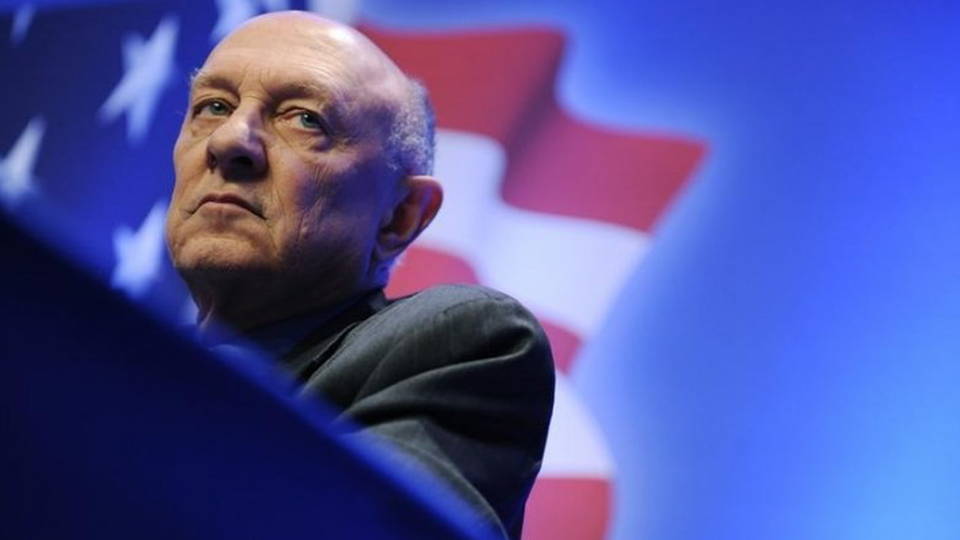 In more campaign news, Donald Trump has named former CIA Director James Woolsey to be his senior adviser on national security. Woolsey is considered a far-right neoconservative. After the 9/11 attacks, he was a leading voice calling for war with Iraq. Donald Trump, in contrast, has repeatedly claimed that he has been against the war in Iraq.
In more campaign news, Donald Trump has named former CIA Director James Woolsey to be his senior adviser on national security. Woolsey is considered a far-right neoconservative. After the 9/11 attacks, he was a leading voice calling for war with Iraq. Donald Trump, in contrast, has repeatedly claimed that he has been against the war in Iraq.TOPICS:
New Video Shows Trump Supporter Punching Anti-Trump Activist
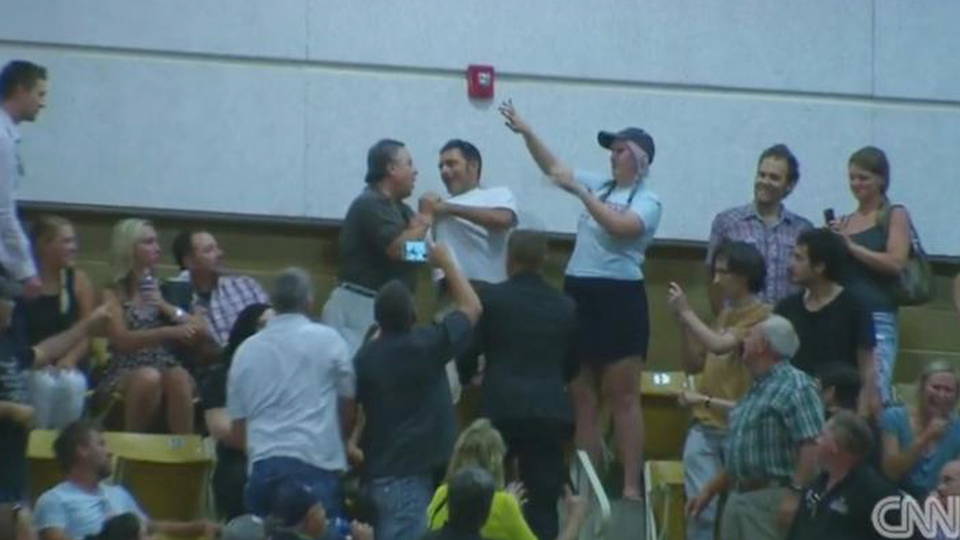 Donald Trump is continuing to attack Hillary Clinton over her comments Friday calling half of Trump supporters "a basket of deplorables." This comes as a new video has emerged of a Trump supporter punching an anti-Trump protester as the protester was being escorted out of a rally in Asheville, North Carolina, Monday. In March, one of Trump’s supporters was caught on video sucker-punching an anti-Trump protester at a rally in North Carolina. Donald Trump said he’d pay the legal fees of this supporter, who also said that the next time he might kill the protester.
Donald Trump is continuing to attack Hillary Clinton over her comments Friday calling half of Trump supporters "a basket of deplorables." This comes as a new video has emerged of a Trump supporter punching an anti-Trump protester as the protester was being escorted out of a rally in Asheville, North Carolina, Monday. In March, one of Trump’s supporters was caught on video sucker-punching an anti-Trump protester at a rally in North Carolina. Donald Trump said he’d pay the legal fees of this supporter, who also said that the next time he might kill the protester.TOPICS:
Mike Pence Refuses to Call Fmr. KKK Leader David Duke "Deplorable"
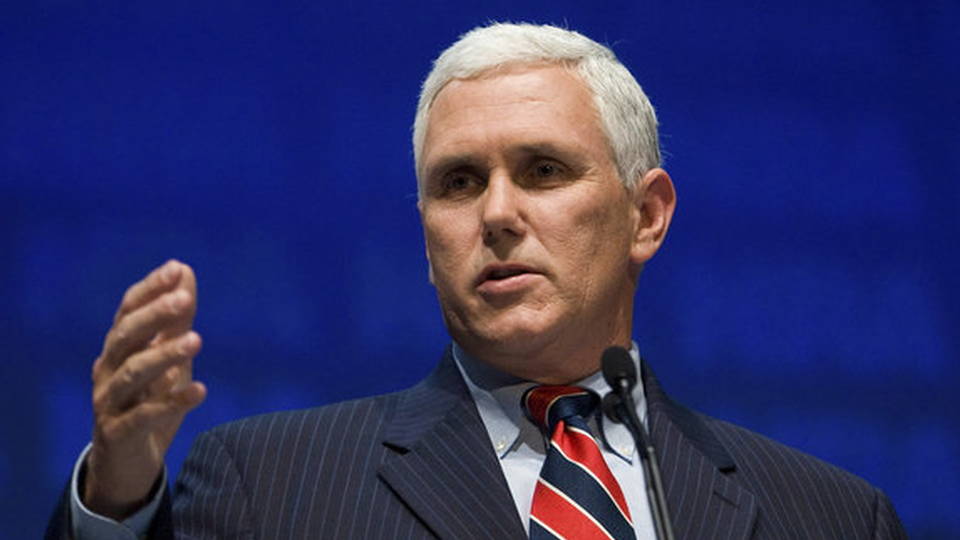 Meanwhile, Donald Trump’s running mate, Indiana Governor Mike Pence, refused to call former Ku Klux Klan leader David Duke "deplorable" during an interview with CNN’s Wolf Blitzer Monday.
Meanwhile, Donald Trump’s running mate, Indiana Governor Mike Pence, refused to call former Ku Klux Klan leader David Duke "deplorable" during an interview with CNN’s Wolf Blitzer Monday.Wolf Blizer: "David Duke, for example, some other white nationalists, whoe would fit into that category of deplorables, right?"
Gov. Mike Pence: "Well, as I’ve told you the last time I was on, I’m not really sure why the media keeps dropping David Duke’s name. Donald Trump has denounced David Duke repeatedly. We don’t want his support, and we don’t want the support of people who think like him."
Wolf Blitzer: "Well, you’d call him a deplorable? You would call him—"
Gov. Mike Pence: "No, I’m not in the name-calling business, Wolf. You know me better than that."
TOPICS:
California Farmworkers Win Major Labor Victory
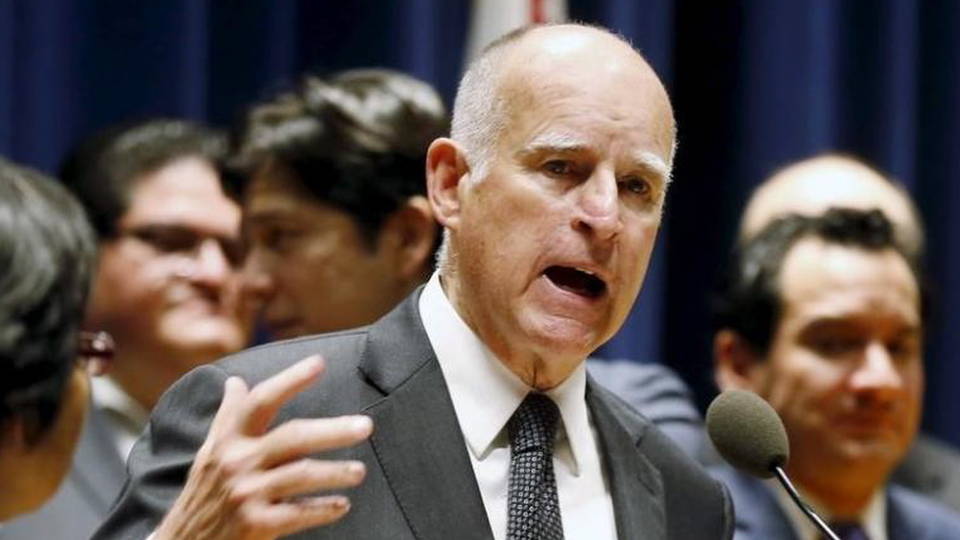 In a major victory for farmworkers, California Governor Jerry Brown has signed legislation requiring paid overtime for hundreds of thousands of farmworkers across California. The new laws come after decades of organizing by the United Farm Workers of America to close gaps in national laws that exclude farmworkers from key labor protections. The UFWprevailed despite an intense lobbying campaign by big agricultural companies against the labor protections. The new laws will be phased in beginning in 2019 and will guarantee paid overtime after eight hours per day, or after 40 hours per week.
In a major victory for farmworkers, California Governor Jerry Brown has signed legislation requiring paid overtime for hundreds of thousands of farmworkers across California. The new laws come after decades of organizing by the United Farm Workers of America to close gaps in national laws that exclude farmworkers from key labor protections. The UFWprevailed despite an intense lobbying campaign by big agricultural companies against the labor protections. The new laws will be phased in beginning in 2019 and will guarantee paid overtime after eight hours per day, or after 40 hours per week.TOPICS:
David Cameron Steps Down from British Parliament
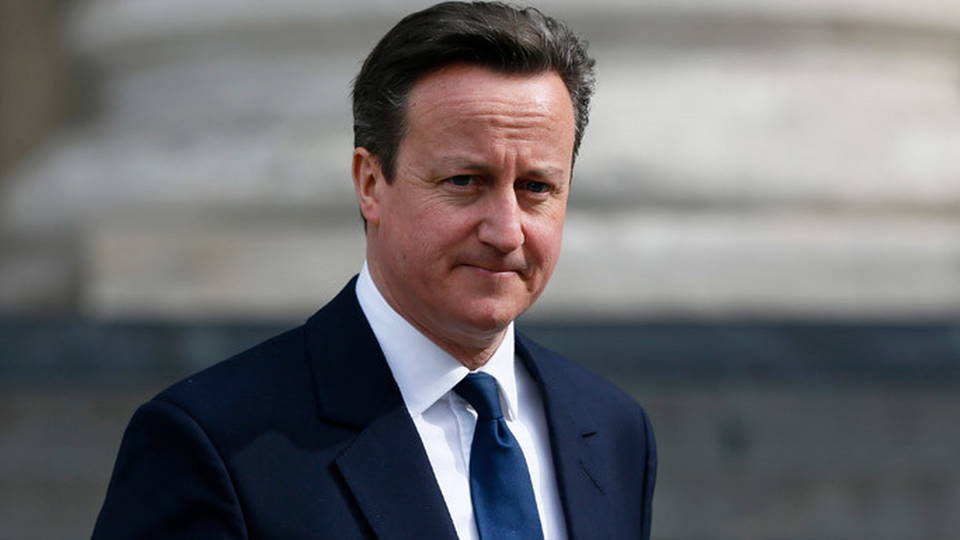 In international news, former British Prime Minister David Cameron has stepped down from Parliament. This comes after Cameron resigned as prime minister in July, less than a month after Britain shocked the world by voting to leave the European Union—a move he’d strongly opposed. Cameron had initially said he wouldn’t resign as prime minister until October and that he would continue to serve as a Parliament member. But on Monday, Cameron stepped down from Parliament, saying he didn’t want to be a distraction for the new prime minister, Theresa May.
In international news, former British Prime Minister David Cameron has stepped down from Parliament. This comes after Cameron resigned as prime minister in July, less than a month after Britain shocked the world by voting to leave the European Union—a move he’d strongly opposed. Cameron had initially said he wouldn’t resign as prime minister until October and that he would continue to serve as a Parliament member. But on Monday, Cameron stepped down from Parliament, saying he didn’t want to be a distraction for the new prime minister, Theresa May.TOPICS:
Brazil: Eduardo Cunha Faces Possible Arrest After House Expulsion
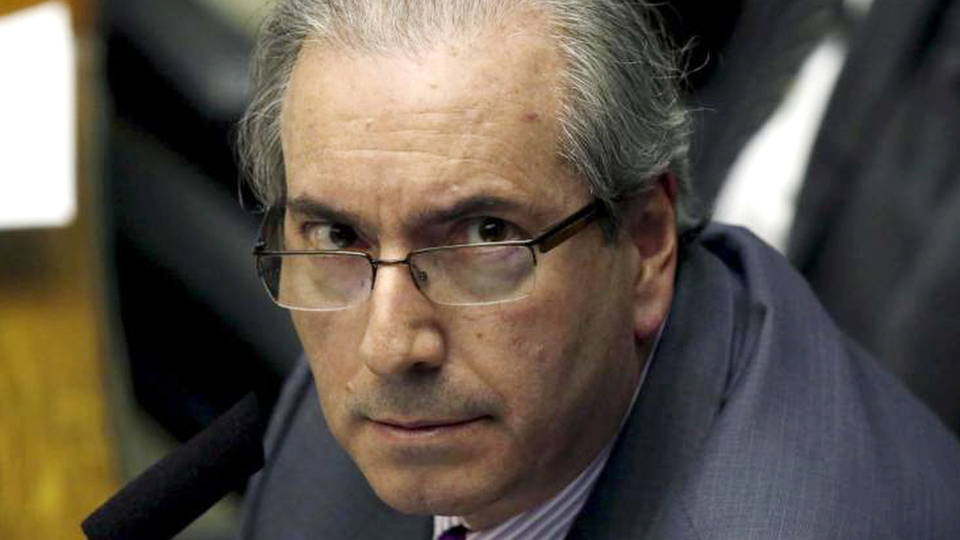 In Brazil, former Speaker Eduardo Cunha, who led the impeachment of former President Dilma Rousseff, is facing possible arrest on charges of perjury and corruption, after he was expelled from the lower house Monday. Cunha’s charges stem from his secret Swiss bank accounts, which he’s lied about. His expulsion strips him of his congressional immunity. Meanwhile, Brazil has ratified the Paris climate deal. Brazil is responsible for emitting about 2.5 percent of global greenhouse gas emissions.
In Brazil, former Speaker Eduardo Cunha, who led the impeachment of former President Dilma Rousseff, is facing possible arrest on charges of perjury and corruption, after he was expelled from the lower house Monday. Cunha’s charges stem from his secret Swiss bank accounts, which he’s lied about. His expulsion strips him of his congressional immunity. Meanwhile, Brazil has ratified the Paris climate deal. Brazil is responsible for emitting about 2.5 percent of global greenhouse gas emissions.Netanyahu Sparks Outrage by Accusing Palestinians of "Ethnic Cleansing"
 Israeli Prime Minister Benjamin Netanyahu has sparked outrage by calling Palestinian opposition to Israeli-only settlements in the Israeli-occupied territories a version of "ethnic cleansing." This is Netanyahu in a video released Friday.
Israeli Prime Minister Benjamin Netanyahu has sparked outrage by calling Palestinian opposition to Israeli-only settlements in the Israeli-occupied territories a version of "ethnic cleansing." This is Netanyahu in a video released Friday.Prime Minister Benjamin Netanyahu: "The Palestinian leadership actually demands a Palestinian state with one precondition: no Jews. There’s a phrase for that. It’s called ethnic cleansing. And this demand is outrageous. It’s even more outrageous that the world doesn’t find this outrageous."
In fact, Palestinian leaders have said that Jews—as well as members of any other religion—could be citizens in a future Palestinian state. Palestinian leaders have long opposed, however, the Israeli-only enclaves that currently dot the Israeli-occupied West Bank. State Department spokesperson Elizabeth Trudeau called Netanyahu’s comments "inappropriate."
Elizabeth Trudeau: "We obviously strongly disagree with the characterization that those who oppose settlement activity or view it as an obstacle to peace are somehow calling for ethnic cleansing of Jews from the West Bank. We believe that using that type of terminology is inappropriate and unhelpful."
TOPICS:
Dozens of Protests Planned Today Against Dakota Access Pipeline
 Today is a global day of action against the $3.8 billion Dakota Access pipeline, which has faced months of opposition from the Standing Rock Sioux Tribe, as well as members of hundreds of other tribes across the U.S. and Canada. As many as 80 protests are expected to take place today in major U.S. cities, including New Orleans, Denver, Anchorage and Honolulu, as well as in Britain, Portugal, Japan and other countries.
Today is a global day of action against the $3.8 billion Dakota Access pipeline, which has faced months of opposition from the Standing Rock Sioux Tribe, as well as members of hundreds of other tribes across the U.S. and Canada. As many as 80 protests are expected to take place today in major U.S. cities, including New Orleans, Denver, Anchorage and Honolulu, as well as in Britain, Portugal, Japan and other countries.TOPICS:
North Dakota: #NoDAPL Organizer Cody Hall Released from Jail
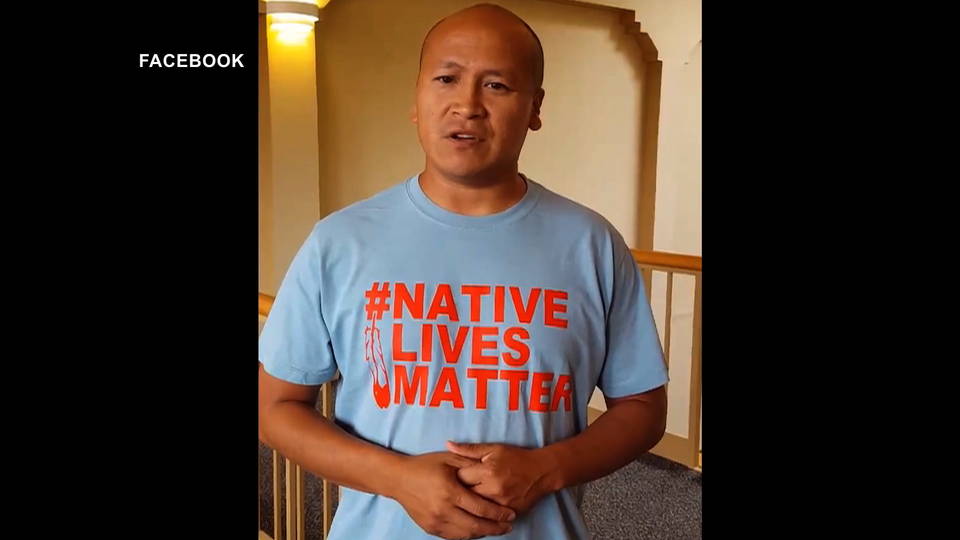 Meanwhile, in North Dakota, Cody Hall of the Cheyenne River Sioux Tribe has been released from jail after being held for three days without bail or bond. Hall says he was chased down by four squad cars and arrested only minutes after going through a checkpoint on Friday afternoon. An arrest warrant had been issued for him over his alleged presence at the September 3 land defense action and for a subsequent protest on September 6. Hall is considered a lead organizer in the movement against the Dakota Access pipeline. Speaking to Democracy Now!, Hall said FBI agents visited him while he was in custody, but that he refused to speak to them. This is Hall speaking in a video after he was released Monday.
Meanwhile, in North Dakota, Cody Hall of the Cheyenne River Sioux Tribe has been released from jail after being held for three days without bail or bond. Hall says he was chased down by four squad cars and arrested only minutes after going through a checkpoint on Friday afternoon. An arrest warrant had been issued for him over his alleged presence at the September 3 land defense action and for a subsequent protest on September 6. Hall is considered a lead organizer in the movement against the Dakota Access pipeline. Speaking to Democracy Now!, Hall said FBI agents visited him while he was in custody, but that he refused to speak to them. This is Hall speaking in a video after he was released Monday.Cody Hall: "I was met with intimidating forces by law enforcement that tried to tried to show their flex and tried break me down mentally and just do those psychological things which I would give myself up to know that I won’t be broken down."
NCAA Moving Championships Out of NC over Anti-LGBT Law
 In sports news, the NCAA has announced it’s moving its seven championship events out of North Carolina for this coming academic year, following North Carolina’s decision to pass the anti-LGBT law known as HB 2, or the "bathroom bill." The law nullifies ordinances protecting LGBT people from discrimination and prohibits transgender people from using the bathroom that matches their gender identity. The ACLU is suing to overturn the law.
In sports news, the NCAA has announced it’s moving its seven championship events out of North Carolina for this coming academic year, following North Carolina’s decision to pass the anti-LGBT law known as HB 2, or the "bathroom bill." The law nullifies ordinances protecting LGBT people from discrimination and prohibits transgender people from using the bathroom that matches their gender identity. The ACLU is suing to overturn the law.TOPICS:
Colin Kaepernick’s Protest Against Police Brutality Spreads
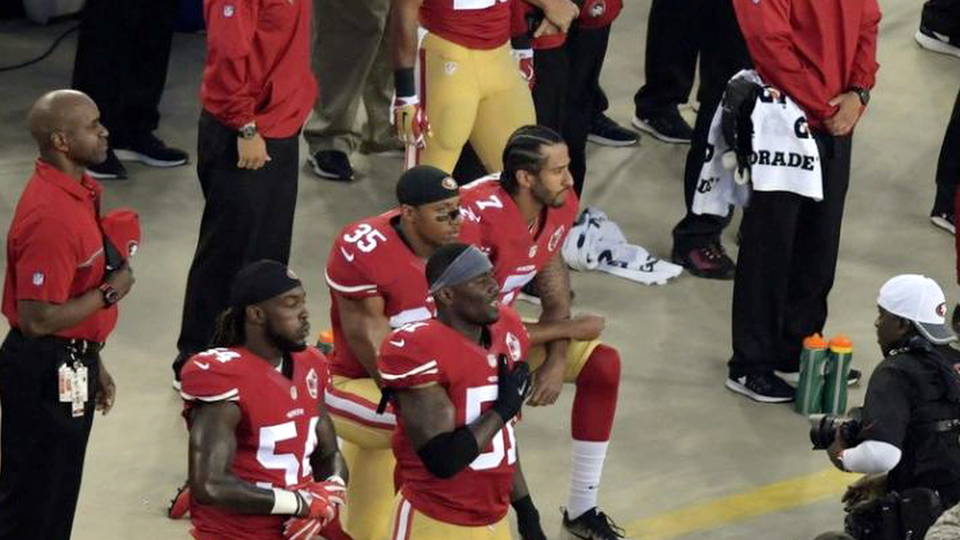 In more sports news, NFL 49ers quarterback Colin Kaepernick and his teammate Eric Reid knelt during the national anthem during the first game of the season against the Los Angeles Rams Monday night. Kaepernick has been refusing to stand for the anthem during preseason games, saying: "I am not going to stand up to show pride in a flag for a country that oppresses black people and people of color." More pro football players have joined the growing protest—as many as 18 players, according to New York Daily News journalist Shaun King. On Sunday, four members of the Miami Dolphins took a knee during the anthem. That same day, players with the New England Patriots, the Tennessee Titans and the Kansas City Chiefs raised their fists in the air as the anthem played, in a protest that recalled the Black Power salutes made by John Carlos and Tommie Smith at the 1968 Olympics in Mexico City. This is Olympian John Carlos, speaking Monday about Colin Kaepernick.
In more sports news, NFL 49ers quarterback Colin Kaepernick and his teammate Eric Reid knelt during the national anthem during the first game of the season against the Los Angeles Rams Monday night. Kaepernick has been refusing to stand for the anthem during preseason games, saying: "I am not going to stand up to show pride in a flag for a country that oppresses black people and people of color." More pro football players have joined the growing protest—as many as 18 players, according to New York Daily News journalist Shaun King. On Sunday, four members of the Miami Dolphins took a knee during the anthem. That same day, players with the New England Patriots, the Tennessee Titans and the Kansas City Chiefs raised their fists in the air as the anthem played, in a protest that recalled the Black Power salutes made by John Carlos and Tommie Smith at the 1968 Olympics in Mexico City. This is Olympian John Carlos, speaking Monday about Colin Kaepernick.John Carlos: "His initial cause is to bring about attention that these atrocities are still taking place, they’ve been taking place for some time now, and time is running out. We need to come together and start to try and resolve these issues. He’s bringing attention to them. And how did he bring attention to them? The same way we did 48 years ago in terms of giving America shock treatment. That’s the only way they move, man, is when you shock them."
TOPICS:
Ryan Lochte Faces Protest on "Dancing with the Stars"
 U.S. Olympic gold medalist swimmer Ryan Lochte faced protest during his appearance on the television show "Dancing with the Stars." Lochte has been charged by Brazilian police for falsely reporting a crime, after he and his teammates claimed they were robbed at gunpoint during the Olympic Games in Rio. Brazilian authorities say the Olympic swimmers actually vandalized a gas station and then invented a story about having been the victims of a robbery. On Monday night, two protesters attempted to rush the stage right after Lochte’s performance of the foxtrot. This is judge Carrie Ann Inaba’s reaction.
U.S. Olympic gold medalist swimmer Ryan Lochte faced protest during his appearance on the television show "Dancing with the Stars." Lochte has been charged by Brazilian police for falsely reporting a crime, after he and his teammates claimed they were robbed at gunpoint during the Olympic Games in Rio. Brazilian authorities say the Olympic swimmers actually vandalized a gas station and then invented a story about having been the victims of a robbery. On Monday night, two protesters attempted to rush the stage right after Lochte’s performance of the foxtrot. This is judge Carrie Ann Inaba’s reaction.Carrie Ann Inaba: "You have a long way to go. Swimming is a—excuse me. Hey, back off! Excuse me. Excuse me. Excuse me. Off! Off! Excuse me."
Tom Bergeron: "Wow, OK. I’ll tell you what. All right, we’re going to—we’ll take a break."
Peace Activist Stanley Sheinbaum Dies at 96
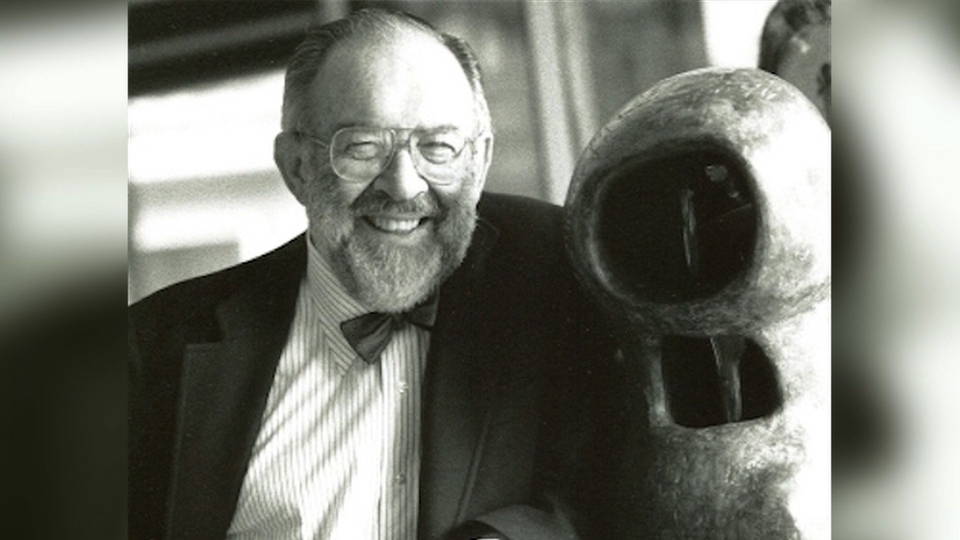 And peace activist Stanley Sheinbaum has died at the age of 96. Sheinbaum grew up in New York City. In the late 1950s, he went to South Vietnam with a Michigan State University group, which he quit once he realized it was in fact a CIA front group. The experience radicalized him and fueled his antiwar activism, and he went on to help Ramparts magazine expose the university group as a CIA front in 1966. He also helped raise funds to defend Pentagon Papers whistleblower Daniel Ellsberg and helped organize to oust Los Angeles Police Chief Daryl Gates after the brutal police beating of Rodney King in 1991. As an American Jew, Sheinbaum also participated in a delegation in the 1980s that met with PLOChair Yasser Arafat and helped pave the way for the 1993 White House meeting between Arafat and Israeli Prime Minister Yitzhak Rabin. Sheinbaum died Monday at his home in Los Angeles.
And peace activist Stanley Sheinbaum has died at the age of 96. Sheinbaum grew up in New York City. In the late 1950s, he went to South Vietnam with a Michigan State University group, which he quit once he realized it was in fact a CIA front group. The experience radicalized him and fueled his antiwar activism, and he went on to help Ramparts magazine expose the university group as a CIA front in 1966. He also helped raise funds to defend Pentagon Papers whistleblower Daniel Ellsberg and helped organize to oust Los Angeles Police Chief Daryl Gates after the brutal police beating of Rodney King in 1991. As an American Jew, Sheinbaum also participated in a delegation in the 1980s that met with PLOChair Yasser Arafat and helped pave the way for the 1993 White House meeting between Arafat and Israeli Prime Minister Yitzhak Rabin. Sheinbaum died Monday at his home in Los Angeles.TOPICS:
Follow:




WEB EXCLUSIVE

Students Support LIU Professors in Contract Dispute: "End the Lockout, Negotiate & Let Us Learn"
NEW BOOK

Senior TV Producer
SPEAKING EVENTS

9/14 New York, NY
9/15 New York, NY
207 West 25th Street, 11th Floor
New York, New York 10001, United States
-------
-------




No comments:
Post a Comment